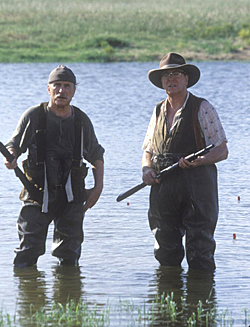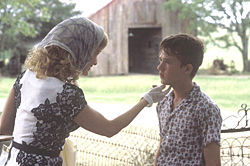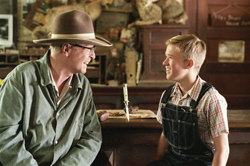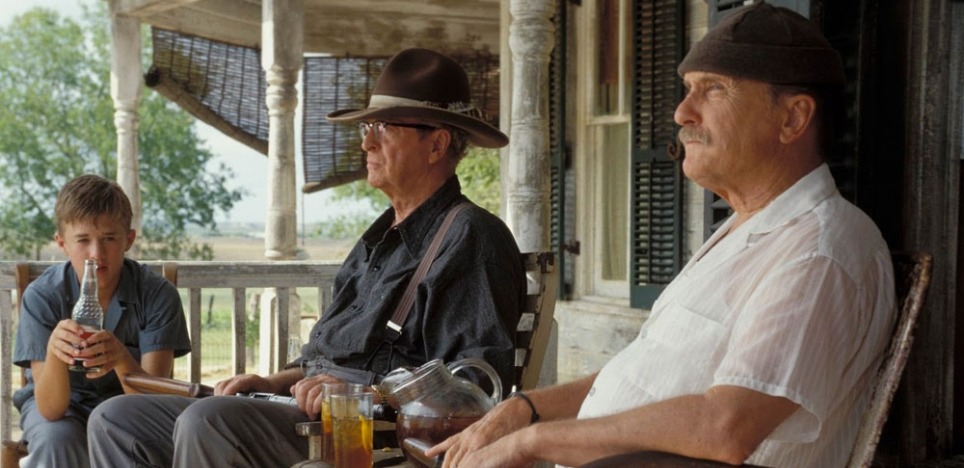
Secondhand Lions is a wonderful coming-of-age story about a shy and sad 14-year-old boy whose stunted spirit soars during a summer stay with his two eccentric uncles. It stars Haley Joel Osment, Michael Caine, and Robert Duvall. Set in Texas during the 1960s, the movie was written and directed by Tim McCanlies (Dancer, Texas, Pop. 81), who also wrote the screenplay for Iron Giant. To read an interview with McCanlies about the film, click here.
This family film has plenty to teach us about choosing what is truest about ourselves, dealing with the originals in our lives, learning from animals, listening to stories as good medicine, finding a code for living, keeping the green growing edge, and mentoring. The film runs 109 minutes and is rated PG for thematic material, language, and action violence. For our review of the film and a plot synopsis, click here.)

1. Choosing What Is Truest About Ourselves
"Choosing what is truest about ourselves is a holy act," Ted Loder writes in The Haunt of Grace. "It comes close to what loving ourselves is all about. It is what grace enables, what mystery touches."
- How would you describe Walter in the beginning of the film? What kind of relationship does he have with his mother? What seems to be missing in his life?
- Who first taught you the benefits of loving yourself and having the courage to develop your unique talents and abilities?
2. Those Originals in Our Lives
In an essay about an eccentric person in Once More Around the Block, Joseph Epstein writes: "To be with him was almost always to be reminded of life's larger possibilities, which is the service performed by people who are original for the rest of us."
- Talk about the special qualities that make Garth and Hub such inimitable characters. In what ways do they each expand Walter's horizons and enable him to see life's larger possibilities?
- Share a story about some eccentric person in your life who has gifted you in some way with his or her enthusiasm, imagination, or creativity. Have you ever been seen as an original who makes it possible for others to open up to their true potential? If so, share that story.
3. Learning from Animals
"I don't think that I can learn from a wild animal how to live in particular — shall I suck warm blood, holding my tail high? . . . But I might learn something of mindlessness, something of the purity of living in the physical senses and the dignity of living without bias or motive," nature writer Annie Dillard once observed.
- What role does the lion play in Walter's coming-of-age experiences with Garth and Hub? What does this wild animal stand for in the drama?
- Give an example or two of something you have learned from an encounter with an animal.

4. Stories That Are Good Medicine
"Stories are medicine . . . They have such power, they do not require that we do anything — we only need listen . . . Stories are embedded with instructions which guide us about the complexities of life," Clarissa Pinkola Estes writes in Women Who Run With the Wolves.
- What is the impact of the swashbuckling stories about Garth and Hub's wild and robust youth upon Walter? Why does he keep coming back for more of these tales? What insights does he pick up about the character traits of his great-uncles? Share your reactions to the cross-cultural revelations that the Walter is privy to in the end of the film.
- What stories about your relatives have been good medicine for you soul? Or briefly relate the essence of a story you have read that has stayed with you and provided moral instruction about the complexities of life.
5. A Code for Living
In the movie, Hub gives Walter the speech he thinks all young men should hear: "If you want to believe in something, believe it. Just because something isn't true, that's no reason you can't believe in it . . . Sometimes the things that may or may not be true are the things a man needs to believe in most: That people are basically good. That honor, virtue and courage mean everything. That money and power mean nothing. That good always triumphs over evil. That true love never dies."
- Share your responses to this code that Hub has come up with after years of adventurous living. What parts of the speech seem to stay with Walter and influence the course of the rest of his life?
- What is your code of living? What truths do you hold dear, learned from personal experience or bequeathed to you by a teacher?
6. Keep That Green Growing Edge
In Learning to Fly Sam Keen quotes theologian and contemporary mystic Howard Thurman on conscious aging: "The hard thing when you get old is to keep your horizons open. The first part of your life everything is in front of you, all your potential and promise. But over the years, you make decisions, your carve yourself into a given shape. Then the challenge is to discover the green growing edge."
- Discuss the differences between Garth and Hub in the way they handle old age with its debilitations and challenges. Where do they each find that green growing edge that proves they are still alive?
- Who are your positive models for the art of growing old gracefully? What ways have they found to make the most out of this stage of life?

7. Downloading the Best of Yourself
"There's so much we've learned, so much we want to save before death pulls the plug. Mentoring gives us a way to 'download' and preserve the best of who we are," Drew Leder writes in Spiritual Passages.
- Discuss how Hub mentors others in this film. Share your reactions to the revelations at the end about Garth and Hub.
- What ways have you found to download the best of who you are to a younger person? What legacy do you want to leave behind?
This guide is one in a series of more than 200 Values & Visions Guides written by Frederic and Mary Ann Brussat. Text copyright 2003 by Frederic and Mary Ann Brussat. Photos courtesy of New Line Pictures. This guide is posted as a service to visitors to www.SpiritualityandPractice.com. It may not be photocopied, reprinted, or distributed electronically without permission from Frederic and Mary Ann Brussat. For this permission and for a list of other guides in the Values & Visions series and ordering information, email your name and mailing address to: brussat@spiritualrx.com.
